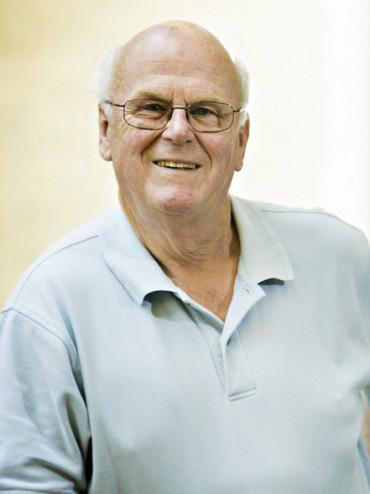
Members of Missouri Right to Life, one of the anti-abortion groups, believe that publicly funded universities should not participate in embryonic stem cell research, as in their view, life is destroyed in the process. This comes at a time when MU has recently been scrutinized by both [supporters](https://www.themaneater.com/stories/2015/9/30/mus-response-planned-parenthood-investigations-res/) and [opponents](https://www.themaneater.com/stories/2015/9/2/mu-hospital-investigated-facilitating-abortions/) of abortion.
R. Michael Roberts, animal science and biochemistry professor at MU and investigator in the Bond Life Sciences Center, is currently working with embryonic stem cells in an effort to treat a disease of the placenta called preeclampsia. This disease affects 5 to 7 percent of pregnant women, and its most severe cases necessitate the child being prematurely born by Caesarean section, a procedure that often saves the lives of both the mother and the baby.
Roberts explained his research this way. Primarily he uses cells from the umbilical cords of babies. Those from the babies born without complication are the control cells. The others come from the umbilical cords of the prematurely born babies whose mothers had preeclampsia. Both sets of umbilical cord cells are converted to induced pluripotent stem cells.
“(We) make cells that are just like embryonic stem cells from regular tissue,” Roberts said. “We put a set of genes in them and they become like embryonic stem cells, except they’re not from embryos.”
Because there is no way to test for or diagnose preeclampsia in the early stages, Roberts uses these induced pluripotent stem cells to recreate the early placental cells from normal control pregnancies and ones from the pregnancies complicated by preeclampsia by adding three simple drugs. The manner in which the two types of newly recreated placental cells differ from each other gives clues to the causes of the disease. The lab also makes placental cells from genuine embryonic stem cells as a further comparison. The latter cells have been in Roberts’ lab for over 10 years and allowed him and his co-workers to develop a means to make placental cells. Roberts said the embryonic stem cells were first isolated at the University of Wisconsin in the mid-1990s after being donated by couples who successfully conceived via in-vitro fertilization and no longer wanted the embryos.
“The ones we use were not developed (at MU),” Roberts said. “They’ve been used in thousands of experiments, not just by us but by other people, and we use them as what we call controls in our experiment.”
Roberts said that the embryos, as products of in-vitro fertilization, were not taken from the female reproductive system. The other cells were taken from babies who were born either normally or after Caesarian section.
“(My research) has nothing to do with abortion,” Roberts said.
Bonnie Diefendorf disagrees.
The Missouri Right to Life state board secretary and Sedalia chapter chairwoman said she believes that this process is still the destroying of life, just like abortion is. Life begins at the moment of conception, Diefendorf said.
“It’d be the same thing as taking the life of a child after it’s born naturally,” Diefendorf said. “That’s just a different stage of development.”
While Roberts said his research follows federal guidelines and is protected by the Missouri [constitution](http://s1.sos.mo.gov/CMSImages/Publications/MissouriConstitution_05.13.2015.pdf), Diefendorf said that though the embryos used were donated from couples who had successful pregnancies by in-vitro, the research was still not ethical.
“If the embryo’s life begins inside a woman or in a petri dish, that is still a human embryo, and so it doesn’t make it less offensive to destroy it,” Diefendorf said.
Missouri Right to Life only opposes embryonic stem cell research, not adult stem cell research. Going forward, Diefendorf said the group will continue monitoring legislation and working to prevent public funds from being used to fund embryonic stem cell research by public universities.
Backlash toward stem cell research came after the recent [controversy](https://www.themaneater.com/stories/2015/10/5/house-votes-defund-planned-parenthood/) surrounding MU’s relationship with Planned Parenthood as they recently revoked refer and follow privileges for physician Colleen McNicholas, in addition to removing agreements in place for graduate students to carry out academic partnerships at Planned Parenthood clinics. Effective Dec. 1, abortion services will end at the Columbia Planned Parenthood clinic if new privileges cannot be found for McNicholas.
Recent investigations into the St. Louis Planned Parenthood clinic by Missouri Attorney General Chris Koster [revealed](https://www.ago.mo.gov/docs/default-source/press-releases/2015/plannedparenthood09-15.pdf?sfvrsn=2) that no illegal sale of fetal tissue for profit was taking place.
Despite the report, Diefendorf said she is not content with the conclusion.
“(The investigation) does not exonerate Planned Parenthood from the activities that they have been involved in,” Diefendorf said. “If they are part of Planned Parenthood, then they are part of a problem.”
Koster, a supporter of embryonic stem cell research, created a [petition](http://act.chriskoster.com/s/science-not-politics/?ms=em15_20151008_ck_stemcell&utm_medium=email&utm_source=koster&utm_campaign=em15_20151008_ck_stemcell&refcode=em15_20151008_ck_stemcell&fn=Rachael&ln=Herndon&pc=65109) online to “keep far-right Republicans in Jefferson City from ending groundbreaking research at Missouri universities,” according to his website.
Roberts said he hopes the anti-abortion activists do not succeed in terminating his research because its intent is to save lives, not end them.
“It is ironic that we are working to cure one of the major causes of maternal and fetal death,” Roberts said, “and yet there are small groups of individuals who would like to see the work halted.”